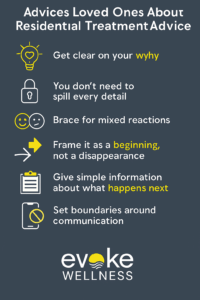You made the decision. You’re entering a residential treatment program. You’ve faced yourself in the mirror and said, “Enough—I’m done living like this.” That’s a victory, no matter how messy your story feels.
But now comes the part that stops a lot of people in their tracks: telling the people who love you. Your parents, your partner, your siblings, your closest friends—the people who’ve seen you struggle and wondered if you’d ever come back to yourself.
At Evoke Wellness Ohio, we see this moment for what it is: terrifying, but necessary. Here’s how to approach it with honesty, dignity, and hope—even if your past is complicated.
Step 1: Get Clear on Why You’re Doing This
Before you make the call or sit down for the conversation, take a moment with yourself. Write it down if you need to. Why are you doing this? Not because someone forced you, not because of court pressure, not because people are mad at you—but because something inside you wants a better life.
Why it matters:
When you know your why, you speak from a place of conviction. This conversation shifts from a “confession” to a declaration of change. You’re not just checking into treatment—you’re taking back control of your life.
Step 2: You Don’t Need to Spill Every Detail
You don’t have to recount every relapse, every broken promise, every low point. You’re not on trial. You are allowed to say something simple like:
“I’ve made the decision to enter a residential treatment program because I want to get healthy and I can’t do this alone anymore.”
Why it matters:
Honesty doesn’t require a full confessional. The goal is to communicate your next step, not relive the past. You’re focusing forward.
Step 3: Brace for Mixed Reactions—And Hold Your Ground
Not everyone’s going to react with happy tears. Some will be relieved. Some will be angry about the past. Some will be guarded because they’ve been disappointed before. That’s okay. This isn’t about winning their approval—it’s about standing up for your future.
Why it matters:
When you anticipate mixed emotions, you’re less likely to get derailed by them. You stay anchored in your choice, knowing that the real work of healing—yours and theirs—starts inside the residential treatment program.
Step 4: Frame It as a Beginning, Not a Disappearance
Treatment isn’t you “disappearing” for 30, 60, or 90 days—it’s you pressing pause to reset. You’re stepping away temporarily so you can come back better, more present, and more capable of being the person you want to be.
Why it matters:
Your loved ones might imagine the worst. Remind them this is an investment in your life—not an escape from it.
Step 5: Give Simple Information About What Happens Next
You don’t have to get clinical, but it helps to give people a rough idea of what comes next. You could say:
“I’ll be in a residential treatment program where I’ll be doing therapy, working on recovery, and focusing on getting healthy. I’ll be safe and I’ll have support every step of the way.”
If you want, you can share that Evoke Wellness Ohio provides medical care, therapy, peer support, and life skills training—whatever helps your loved ones understand this is serious care.
Step 6: Set Boundaries Around Communication
This is important. You don’t owe anyone constant updates. You are allowed to prioritize your recovery. You might say:
“I’ll check in when I can, but the program recommends I focus on myself right now. Please understand if I’m not available like usual—it’s part of the process.”
Why it matters:
Boundaries protect your recovery. You can reconnect with people after you’ve had time to stabilize and heal.
Step 7: Leave the Door Open for Rebuilding
You might have people in your life you’ve hurt. People you’ve lied to. People who’ve distanced themselves. It’s okay to acknowledge it without getting stuck there:
“I know I’ve messed up a lot of things, and I know it’ll take time to rebuild trust. I’m okay with that. I just wanted you to know I’m finally taking real steps to change.”
Why it matters:
This conversation is planting seeds. You don’t have to fix everything overnight—but you can show them you’re serious about growing.
When you’re ready to stop surviving and start rebuilding, we’re here. Call (866) 430-9267 to learn about our residential treatment program services in Hilliard, Ohio. You deserve a fresh start. Let us help you take it.
FAQs: Telling Loved Ones About Going to Residential Treatment
Q: What if I’m scared they’ll be angry?
A: Anger can happen—especially if your addiction has hurt them. Don’t let it derail your decision. You are choosing health, and with time, many relationships can repair after treatment.
Q: Should I tell everyone in my life or just close family?
A: It’s up to you. Many people start with those closest to them. There’s no need to tell everyone unless you feel it serves your recovery. Focus on people who matter most to you.
Q: What if people try to talk me out of it?
A: That can happen, especially if others don’t understand addiction or have their own biases about treatment. Stay grounded in your why. This is your decision, and you don’t need approval to do what’s right for your health.
Q: Do I have to tell my job or school I’m going into treatment?
A: You can speak to a case manager about your legal rights around medical leave. Honesty helps, but you are not required to share details beyond your comfort level.
Q: What if I’m ashamed of what I’ve done—how do I even begin?
A: You begin by saying the truth: “I’ve been struggling and I need help.” Most loved ones respect honesty and courage. Your actions moving forward will speak louder than any past mistake.



